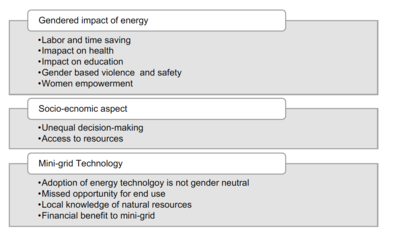Click here to register!
Gender Mainstreaming in Energy - Need
Gender Mainstreaming in Mini-grid
According to the United Nations Economic and Social Council gender mainstreaming is defined as “a strategy for making women’s as well as men’s concerns and experiences an integral dimension of the design,implementation, monitoring and evaluation of the policies and programmes in all political, economic and societal spheres so that women and men benefit equally and inequality is not perpetuated”[1].
Need for Gender Mainstreaming in Energy
Men and women access and use energy for different purposes and therefore lack of it also affects them differently[2]. This is because access to and use of energy is determined by differnet factors such as their gender roles in the society, the kind of work they do and the resources they have access to.
Understanding these gendered use/impacts of energy helps in designing sustainable energy solutions that benefit both men and women equally. Gender mainstreaming also acknowledges women’s contribution and involves them in all stages of the reneweable system design. It also helps to limit any negative impact that could occur due to the gender blind planning process and policies[3].
Figure 3 summarizes why gender mainstreaming is important in energy (especially for mini-grids)
- ↑ UNDP. (2007a). Gender mainstreaming: A key driver of development in environment & energy.Retrieved from http://www.undp.org/content/undp/en/home/librarypage/environmentenergy/sustainable_energy/gender_mainstreamingakeydriverofdevelopmentinenvironmentenergy.html
- ↑ Cite error: Invalid
<ref>tag; no text was provided for refs namedUNDP, 2001a - ↑ Cite error: Invalid
<ref>tag; no text was provided for refs namedCecealski, 2000




















